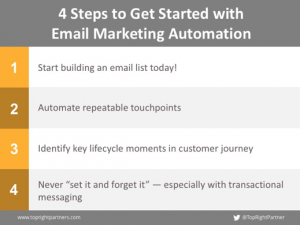— August 25, 2018
“Build it and they will come!”
We see this (and other pithy advice) work all the time in Hollywood, but unfortunately not so much in the real world of sales or entrepreneurship – especially when it comes to business websites. I often coach start-ups and entrepreneurs who have fallen for the logic of Hollywood, and the result is stalled success at a minimum and people walking away from their dreams in the extreme.
I am a firm believer in the value of a website to generate business, and my own income is largely dependent on the success of websites I built for my businesses starting in 1999. But far too many new businesses focus on building their website as if it were some magical magnet that will bring traffic, rather than the true reality which is the inverse: Successful business leaders bring traffic to the website.
Yes, there are wild success stories of websites and products going viral and catching attention in creative ways. However, this is the unlikely scenario. Just like the front door of your business, it is your job to bring traffic to it. Your website is more likely to serve as your virtual showroom and your struggle is the same as every other business – to create a bigger identity.
Do you have a service to provide or a product to sell? Yes, build a website. If nothing else, it will serve as a way of enhancing your credibility when customers do search the web for you. Yes, get in directory and listing services, they can enhance your identity and bring you some new customers.
The problem I see in many situations is people spend an enormous amount of time and money building a website believing that somehow the investment in this is the single most productive use of time. It has been my experience that in every business I have owned, from restaurants to online educational services, the best use of my time is building relationships – with real people in real places.

rawpixel / Pixabay
Making it to every Chamber of Commerce event is more productive than skipping a meeting and trying to find the perfect font. Fonts don’t buy products, people do. Clients and customers are found in community meetings. I go to meet-up groups because in every group I attend, decision makers are present and are more likely to decide to pick me than someone they have never met.
I am a big fan of old school prospecting. If you do not have enough customers, redesigning the contact page on your website is not going to bring you new leads. But by taking your printed flyer and business card to every office in your building, popping into the reception area, and introducing yourself you will create the solid personal connection necessary to turn a skeptic into a believer.
I worked with a professional recently who complained the phone just wasn’t ringing. He was in a six-story office building with at least 50 other offices in the building. I asked him if he had ever been in any of the other offices and he said no. I told him to take his card and flyer and go to every business in the building and say, “I am your neighbor and I just wanted to find out a little bit more about the services you provide. These are my services.” He finally did it – in part because I told him I would not coach him anymore without actually following the advice he was paying me for.
The result? He booked two new clients within a week from his meet and greets, and several more in the weeks that followed. One of the downsides of the Internet is that we have tried to move everything onto social media, but nothing works better than building real relationships with real people. His building had 6 floors and 50 offices, but it was next to two other buildings with 100 more offices a piece. All of this is are in a neighborhood with probably thousands of easily accessible people. A couple weeks of old school prospecting like this, and one could potentially generate enough business to last a year.
But what holds us back for doing it this way? Some of it is our misbelief that the Internet makes it easy for us. It doesn’t. It gives us the illusion of being busy in most cases and the illusion of prospecting, but the real work is done in real relationships.
Audible, the audio-book publisher, created a niche in 1994 and has dominated the market. Eventually, the founder (Don Katz) sold to Amazon and took a $ 300 million payout. Even though both Amazon and Audible are clearly Internet companies, the connection that eventually led to a deal was in a relationship Katz fostered early on with Jeff Bezos by flying to Seattle and having coffee with him.
Real world sales and marketing is predicated on community, and the only way to be a part of the community is to actually be a part of it. When this is done, your website will service you well, because you will be the driver of traffic, rather than the mythical SEO fairies so many of us have continued to believe in.
Business & Finance Articles on Business 2 Community
(53)
Report Post





